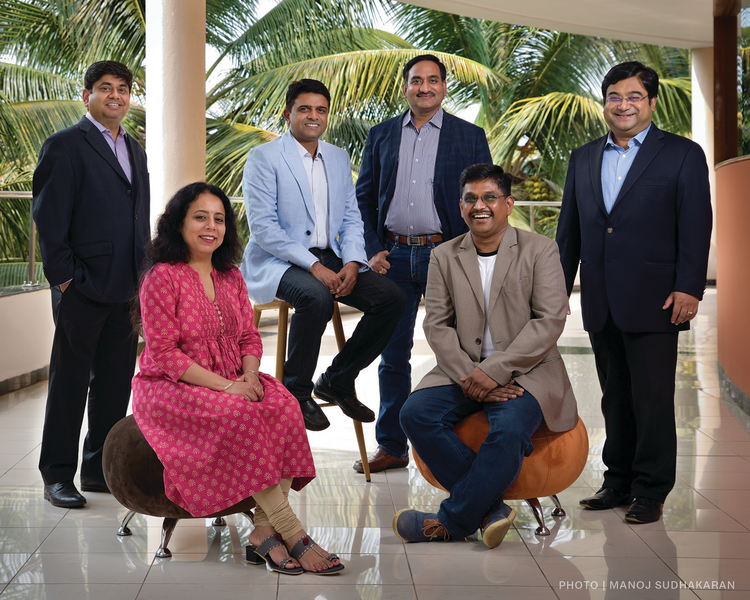TD Magazine Article
Member Benefit
Start With People, End With Solutions
A next-gen learning platform is only one element of an advanced TD strategy aimed at meeting tomorrow's client needs at Infosys.
Mon Jul 20 2020

Infosys Limited: 2020 BEST Award Winner, Best of the BEST
10-Time Winner

A next-gen learning platform is only one element of an advanced TD strategy aimed at meeting tomorrow's client needs at Infosys.
Infosys Limited | Bengaluru, India
10-Time Winner | Best of the BEST
Leave it to a global provider of next-generation digital services to practice what it preaches.
At India's Infosys, a business strategy based on helping clients transform themselves in the digital age is propelled by a talent model that empowers employees to reach new professional heights through upskilling. The model's ingredients include a next-gen learning platform created with design thinking techniques.
The story begins with a sobering challenge the company faced in 2017 and 2018. It needed to bolster its competitive stance in the rapidly emerging digital era of artificial intelligence, big data, automation, cloud computing, and cybersecurity. As clients began to go digital, the need to upskill employees became a priority.
The company's new goal was to empower its 229,000 employees to freely reskill so they could meet the disparate opportunities ahead. But charting a path to that end, one that would motivate employees and free them to pursue their own ambitions, posed numerous challenges for the learning function.
Its answer was a new talent strategy that would: transform the work so that jobs are designed around capabilities in digital areas requiring technical and solution expertise; create an always-on learning ecosystem aimed with laser precision for today's upwardly mobile worker; and create a pull-based pipeline filled with opportunities for open source talent.
Five principles
Using design thinking, Thirumala Arohi, vice president and head of education, training, and assessment, spearheaded the cross-functional effort with input from unit leaders and the HR organization and development team.
"Every big company has started to realize that digital is going to be key to making themselves relevant in their markets," says Arohi. "TD teams will play a major role. At Infosys, we asked how we could transfer our talent to meet the changing dynamics of the marketplace and the new role talent must play."
Specifically, Arohi's team designed the transformation journey around five core principles:
Employees must be motivated to learn. The team eliminated all learning barriers to ensure that employees enjoyed total control over their personal learning journeys.
Managers must play an active role in supporting and guiding their teams.
Learning content is organized in microlearn-ing modules to meet just-in-time needs.
A modern learning experience akin to Netflix and YouTube should guide every user on a cloud-based mobile platform.
An AI-based virtual learning assistant would bring agile learning to the platform. Content and programs would meet needs for continuous release cycles.
Arohi's team also divided employee skills requirements into three separate categories: core, new, and emerging skills. It identified 10 service themes, 27 new service offerings, and 80 key skills and then created training programs and learning paths around each for individuals of varying skill levels and job categories. All were aligned with a hiring approach that recruits employees of all career and skill levels.
In addition, a new employee upskilling plan called for profiling employees' skills and then recommending target skills that staff could reach via structured learning paths and competency development. For example, through the new learning paths, a Java programmer could become a cloud software development and IT operations professional in two to four weeks or a data scientist in five weeks.
AI-based platform
The initiative's centerpiece is a next-gen digital learning platform named Lex. The team carefully designed it to accelerate the "talent transformation journey" for every employee at every career specialty and level. Job creators and seekers can connect freely on the site without intermediaries.
Conceived as a one-stop shop, the platform enables employees to manage every learning experience. "The only thing an employee needs to bring to the table is the motivation to learn. We do the rest," Arohi contends, voicing guidelines the company's leadership established.
An AI-enhanced virtual digital assistant known as Zoiee facilitates employee learning experiences. Created in-house, the conversational interface sits atop the AI platform. Upon sign-in, the avatar greets users, reviews their previous interaction, lists new courses or other information of relevance, and asks for directions.
Various learning experiences and career possibilities await users' reply to this friendly guide on the side. Employees can ask Zoiee to select specific depths of learning that fit their immediate job-related needs. If the request involves a potential job vacancy, one learner may seek the learning necessary for certification. Another employee may only seek a cursory explanation of a given topic to prepare for a meeting.
Or a learner may say, "Today I want to test my own knowledge on a particular topic." Zoiee responds with questions from the platform's quiz master and tracks the answers in the system for future reference. It can also line up the learner with a live instructor if the platform's extensive access to learning content isn't sufficient.
In addition, users can link to a separate digital career platform called Compass that guides them along various career paths of interest. It suggests continuous learning opportunities and ways to access resources at their disposal. Other opportunities include bridge programs, which are structured solutions for employees to shift their careers within the organization that would otherwise be possible only through higher education.
It's all by design
An integral part of the development process was design thinking's contribution. Arohi contends that his team developed the Lex platform as an outcome of a design thinking exercise held with focus groups.
For example, one feature enables learners to share their personal learning paths with others. The concept stemmed from the suggestion of a focus group member who enjoys the digital music site Spotify, which enables listeners to share their playlists. Says Arohi: "Why shouldn't learners enjoy the same flexibility to share their personal learning paths?"
He adds that design thinking plays an "extremely important role" at Infosys. "We don't just want our talent engaged in solving problems. We want them to become problem finders. The best framework is to get them engaged in design thinking."
That is why the onboarding process for every new employee includes two full days on the subject followed by a requirement to employ design thinking concepts on the job.
Last, the company considers business performance a direct indication of the project management process' effectiveness. It closely tracks the performance of employees, managers, and leaders to gain insights on expected growth and commitments made to shareholders. Infosys reports that during the past year, it has seen a 7.9 percent growth in revenue.
View the entire list of 2020 BEST Award winners.

